Pulling back the curtain on the tech and politics behind ‘Watch Dogs: Legion’
Clint Hocking marked his return to Ubisoft in 2015 with a big idea. His new project “Watch Dogs: Legion” was ambitious, and its concept was born from a single question: What if you could play as anyone?
It had never been done before. In open-world games, players normally control a single protagonist, or a couple of carefully crafted main characters. But Hocking envisioned a Watch Dogs game where players could explore a metropolitan city and, with the press of a button, switch perspectives to inhabit the body of a spy, construction worker or an average Joe walking to their office job. Every passerby is their own person, primed with a web of relationships, an occupation and a personality. It flipped the notion of NPCs (non-player characters) on its head by making each and every person in the game playable.

Clint Hocking envisioned a “Watch Dogs” game where players could switch perspectives to inhabit the body of another person, such as a construction worker.

With the press of a button players can become a street artist, an old woman, or an average Joe.
LEFT: Clint Hocking envisioned a “Watch Dogs” game where players could switch perspectives to inhabit the body of another person, such as a construction worker. RIGHT: With the press of a button players can become a street artist, an old woman, or an average Joe.
“To me, it’s in a way fulfilling part of that original promise [of the series],” game director Kent Hudson said, reflecting on the first Watch Dogs trailer shown at E3 in 2012, which mused about personal data and city infrastructure being controlled by a mega corporation’s software. “Everything can be hacked,” the trailer eerily warned. “Legion” became Ubisoft’s chance to realize that concept in a more believable simulation.
“The point is that anybody can be a hero,” Hocking said. “Anybody can have a reason to fight for a better tomorrow. And then we landed on play as anyone. It was on fire from there.”
The people walking the London streets in “Legion” all carry their own story. And they’re capable of pulling together as a collective to confront a corrupt power. It’s a core premise of both the game’s interactive innovation and the story’s themes. It also unintentionally parallels issues playing out at Ubisoft in the real world.
“Watch Dogs: Legion” arrives amid a tumultuous year for the French publisher. Ubisoft faced scrutiny and backlash following controversies ranging from racial insensitivity in games like the mobile title “Tom Clancy’s Elite Squad” to sexual misconduct allegations. The latter resulted in several high-profile executives undergoing investigation, leading to many departures at the company and raising questions about abuse of power.
[Video game companies vow to fight racism in their communities, but offer few details]
Now, the “Watch Dogs: Legion” developers find themselves in an uncomfortable position, living under the shadow of a scandal as they prepare to share the final result of their years of labor.
“No one’s happy about it,” Hocking said. “It’s been very demoralizing and very difficult to deal with. … It’s a blow to have this happen to us. But I hope it goes without saying, we support those who’ve had the courage to speak out.”
For their part, the “Legion” developers remain focused on their creation, even as they confront unsettling realities — a final challenge after already navigating so many.
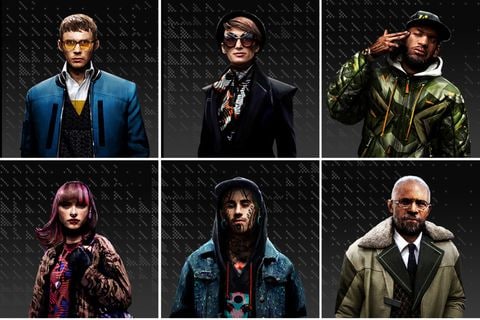 Characters from “Watch Dogs: Legion” (Ubisoft)
Characters from “Watch Dogs: Legion” (Ubisoft) Fueled by ambition
Like most sequels in the Triple A space, “Watch Dogs: Legion” was a safe enough bet financially: the first two Watch Dogs games sold more than 20 million copies combined. But building the required technology to make “Legion” work was a calculated risk. Because the game aimed to reinvent a major piece of open-world design, it made the already enormous video game creation process even tougher. Despite his ambitious vision, Hocking said he had major hesitations, explaining that it’s been “hard the whole time, every step of the way.”
“We were often uncertain,” Hocking said. “And I wasn’t the only one who was uncertain. It was really difficult and scary.”
The project also inspired excitement, according to those interviewed, so much that Hudson left Oculus in San Francisco after hearing about the ambitious undertaking. But breaking ground meant battling roadblocks, which were met in each department. Hocking said prototypes were “dying on the vine” in the first couple years, and he struggled to keep the team’s morale up when obstacles were so frequent.
“We ended up having these meetings called ‘The Beast’ meetings, where it’s just a bunch of programmers sitting in a room saying, ‘How the heck are we going to do any of this stuff?’” team lead programmer Chris Dragert said. “But at the same time, it’s great. We’re the kinds of people who like a challenge and the open-ended nature of it. And just the fact that it hadn’t been done before meant we were drawing onto a blank canvas.”
Many of the problems stemmed from the sheer number of variables the developers needed to address to realize the “play as anyone” vision. Predicting player behavior from a development standpoint is difficult; what happens when developers can’t even predict who the protagonist is?
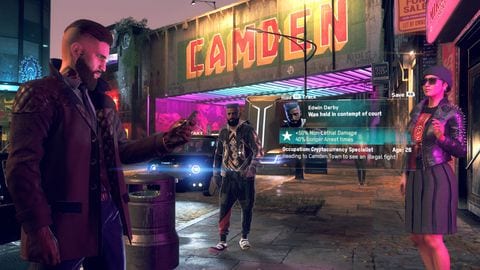 Building the required technology to make the “play as anyone” concept work was a challenge. (Ubisoft)
Building the required technology to make the “play as anyone” concept work was a challenge. (Ubisoft) Liz England, the team lead game designer, explained that for the creation of “Watch Dogs: Legion,” it was less about predicting player behavior, and more about accounting for every possible scenario.
“It’s not that you can play as anyone; it’s that you can play as everyone,” she said. “If we say that anyone can be in this mission, we’re actually saying every single character that could ever spawn in the game can be in this mission.”
One conundrum faced by the animators: How would they build cinematics around a character when they wouldn’t know what the character looked like, how tall they were, what skin tone they had, or even what words they’d speak? If you don’t know how long the lines are, there’s no way to know when the camera should cut. Ubisoft’s solution was to build new tech to account for the unpredictability, without sacrificing the gold standard of Triple-A cinematic quality the studio is known for.
“If you see a cinematic with one character and a different character and their lines are different lengths, the scene will dynamically expand and compress itself,” Hocking said. “Animations will be sped up and slowed down, and camera angles will wait for specific markers to shift in the light. The dynamic lighting rig will be different based on the skin tones and all of these things.”
That solution, however, solved but one of many challenges.
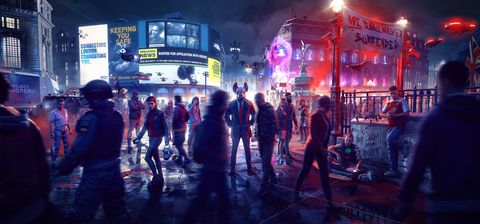 Originally, “Watch Dogs: Legion” was planned to have five main quest lines offering different stories, but playtest sessions showed this approach was too confusing. (Ubisoft)
Originally, “Watch Dogs: Legion” was planned to have five main quest lines offering different stories, but playtest sessions showed this approach was too confusing. (Ubisoft) With so many unpredictable factors involved, Hocking had no idea how the team would write the script, at least early on. Originally, “Watch Dogs: Legion” was planned to have five main quest lines offering different stories, but playtest sessions showed this approach was too confusing.
“We just had to treat the resistance group, DedSec itself, as the protagonist,” lead writer Cameron Labine said. “And DedSec goes through a traditional hero’s journey no matter who’s on the team.”
[‘Watch Dogs 2’ review: A fun combination of hacker fantasy and feel-good teen movie]
Ubisoft formed a “massive” writing department, often with each writer working on a single persona (i.e. an elderly woman). Those personas were then matched with all sorts of other combinations to bring diversity to characters, like voice work, sets of animations, abilities, backstories and a procedurally-generated face and body type.
“We decided near the beginning that we’d write the script a whole bunch of times,” Hocking said. “There was a technique that we used, which was that the script was written once with generic lines, giving the structure of conversation. And in every new version of the script, the generic lines were rewritten for every possible character.”
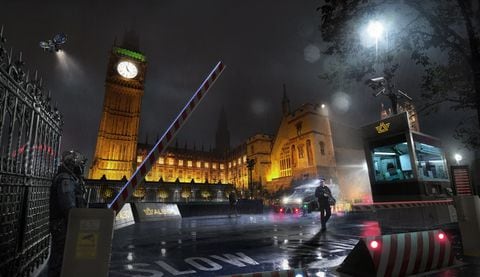 Concept art of The Palace of Westminster and Big Ben in “Watch Dogs: Legion.” (Ubisoft)
Concept art of The Palace of Westminster and Big Ben in “Watch Dogs: Legion.” (Ubisoft) Building a believable world
To ensure variety among all those characters, the developers again needed to innovate. Using census data from the UK, Ubisoft modeled their fictional London from actual demographics. These numbers, including income and minority percentages, were then placed into the Census System, an internal term Ubisoft used to describe the behind-the-scenes database of “Watch Dogs: Legion” that generates each character and their relationships.
“In a lot of ways, the [Census] System felt like a series of brick walls,” Dragert said. “It felt like every week we had something where we had no idea what we were going to do with it. And then eventually that just became the flow of the project.”
Hocking said the system weighs “many, many factors” in an attempt to “stop it from feeling random.” To that end, it provides logic to characters’ behavior, too.
For example, it simulates scenarios such as a husband and wife frequenting a restaurant for date night. However, the wife will stop going to the restaurant if the husband is killed in the game. Instead, she can be found at a cemetery mourning his death.
Constraints of time and money make it nearly impossible to make every single character within the game unique, but Hocking believes they succeeded in suspending the player’s disbelief enough for a robust experience.

Using census data from the UK, Ubisoft modeled a fictional London from actual demographics.

The information was then placed into the game’s internal database that generates each character and their relationships.
LEFT: Using census data from the UK, Ubisoft modeled a fictional London from actual demographics. RIGHT: The information was then placed into the game’s internal database that generates each character and their relationships.
“There isn’t infinite diversity,” Hocking said. “You’re still going to encounter, ‘Oh, yeah. I recognize that voice. I recognize that person. Or, this is one of the people who has the technician fighting style. They fight in a certain way, [similar to] that other person.’ But it still blurs the lines quite a bit.”
Sometimes you may find a combination of an accent, ethnicity, skin tone or voice that may seem unusual. There, the developers point out the possibility that the character could be a second-generation immigrant or the accent being a result of a person’s upbringing.
“It’s true that you could encounter a Caucasian person speaking with a Jamaican accent, for example, and that will come off as super weird,” Hocking said. “It’s very, very rare. But the reality is, if you go to Jamaica and you walk down the street and you have a conversation with a White person who’s born and raised in Jamaica, they probably have a Jamaican accent.”
Ubisoft kept diversity and representation in mind while populating the game’s virtual world. Voice director Natalia Hinds, for example, is a Black South Londoner of Jamaican descent, and said it’s an “incredible feeling” to be appropriately represented within the game. She worked with 50-100 voice actors, hailing from London’s many boroughs and other places around the world to help capture the city’s multiculturalism.
Many of the recorded voices were then put through a voice modulation system, known as formant modulation technology.
“Essentially it’s a physical simulation of a throat and vocal cords — everything that goes on inside your neck when you talk,” Hocking said. “We record an actor, have them say all of their lines and then we can use that at runtime. As the line is being said, the sound file goes through this physical simulation of vocal cords and produces a different voice.”
Half a dozen settings are available for each voice, changing the sound of inflection and pitch, which Hocking called a “small number.” But when combined with sets of animations, differing lines of dialogue and a narrative persona, it created so much variety that England, the team lead game designer, needed to go online for help defining the total number of combinations.
“It had so many zeros I’d never seen before and I didn’t know what to call it,” England said.
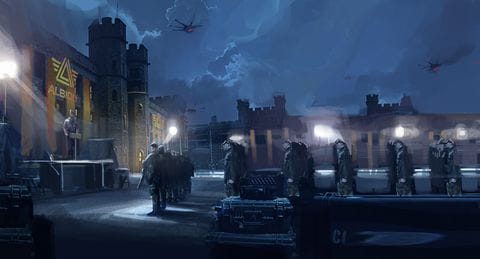 Concept art of a scene at the Tower of London in “Watch Dogs: Legion.” (Ubisoft)
Concept art of a scene at the Tower of London in “Watch Dogs: Legion.” (Ubisoft) An uneasy backdrop
Ubisoft has long had a troubled relationship with politics in its games. Despite themes like religious radicalization in rural America within “Far Cry 5” and rogue American soldiers assassinating an election candidate in “Ghost Recon Breakpoint,” Ubisoft has repeatedly affirmed to the public that its games are apolitical, or that it’s up to players to draw their own conclusions. Much of the time, no strong stances are taken narratively on sensitive topics in these games, despite overtly political backdrops.
But in August 2019, Ubisoft acknowledged it was not “taking it far enough” with political narratives. With “Legion’s” post-Brexit backdrop depicting a partisan, divided United Kingdom becoming a dangerous surveillance state, just how far is Ubisoft willing to go?
“This is a game with story lines about xenophobia, authoritarianism, the militarization of the police, about relevant things,” Hudson said. “And we take a position on that stuff and we deal with it head on. I certainly don’t think we’re shy about that.”
[Playing as an elderly woman in ‘Watch Dogs: Legion’ brings thrills, danger and laughs]
One such story line chronicles deporting foreigners “out of xenophobic fear.” Some recruiting missions require you to free a person from unjust incarceration. The game even features a holding camp for those waiting to be deported.
“Every creative work takes a political stance,” Hocking said. “That’s not even a question. Either you’re making explicit statements or you’re just accepting implicit statements, maybe in the status quo or something like that. And we’ve never been shy about it. I said it onstage at E3, there are authoritarians and we are opposed to them.”

“Watch Dogs: Legion” features story lines about authoritarianism and the militarization of the police, as seen in this propaganda art from the game.

“Every creative work takes a political stance,” Hocking said.
LEFT: “Watch Dogs: Legion” features story lines about authoritarianism and the militarization of the police, as seen in this propaganda art from the game. RIGHT: “Every creative work takes a political stance,” Hocking said.
To Hocking, the message of the game is less about taking a stance on politics, and more about how the fictional society responds to them. He explains it’s about “empathy,” and recognizing “the value in your neighbor.” Whether that’s political is “up to the audience,” he said.
“I think the message that we’re trying to say is it’s not about waiting for the hero,” Hocking said. “It’s about all of us working together and trying to fix what’s wrong.”
Some narrative beats and features in the game draw parallels to, or are directly inspired by current events, Hudson said. You can customize your character with a covid-19 mask, for example, which was added as a response to the pandemic. Other issues, like Black Lives Matter, “reached a boiling point fairly late” in the development of “Watch Dogs: Legion,” Hocking said, but he believes there are thematic similarities in the game to the movement, and so does Hudson.
“It’s not hard to look at the protest movements around the world right now and identify the same themes of how we’ve all got to come together and fight back against the authorities that are leading us down this path,” Hudson said.
Yet, there could also be some awkwardness; in the game, police are defunded, and Albion — the evil, corporate antagonist — receives private commissions from the government. In an interview with Game Informer at E3 2019, Hocking said the police in “Watch Dogs: Legion” were “painted as sympathetic characters” who are “loosely but reluctantly affiliated with Albion, who are the security forces.” Hocking expressed the team found itself in a “very unusual situation,” regarding recent events, and reiterated that the game is set in the United Kingdom, not America.
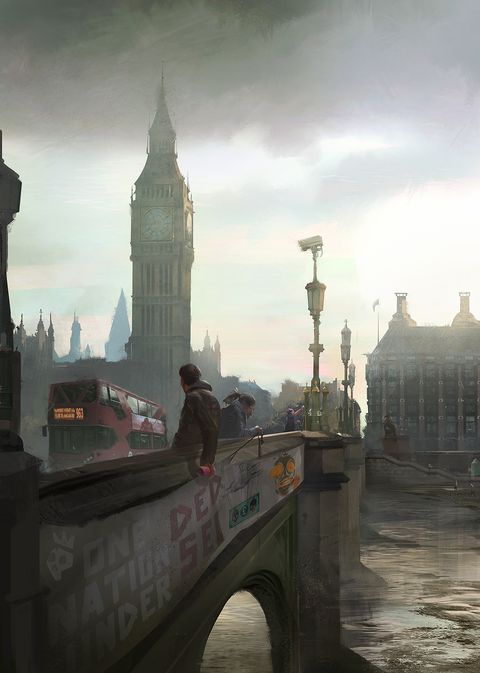 “We just had to treat the resistance group, DedSec itself, as the protagonist,” lead writer Cameron Labine said. “And DedSec goes through a traditional hero’s journey no matter who’s on the team.” (Ubisoft)
“We just had to treat the resistance group, DedSec itself, as the protagonist,” lead writer Cameron Labine said. “And DedSec goes through a traditional hero’s journey no matter who’s on the team.” (Ubisoft) “It’s kind of an awkward conversation because of what’s going on in the real world right now that we didn’t have the time to address in a meaningful way, and I don’t mean that as an excuse,” he said. “I also don’t even know how we would address it. … Had we had time to go, ‘Okay, if we were going to have another year to change the game, what would we do differently in the way we depict the police and Albion?’ The themes of our game are more about the privatization and the problems that come with that, and turning over the controls of public infrastructure and public service to private interests.”
The game’s themes also share some uncomfortable overlap with Ubisoft’s own upheaval. This summer, allegations arose at the company in regards to sexual misconduct and harassment. The Ubisoft Toronto studio was implicated in the scandal as well, with vice president Maxime Beland resigning after an investigation into allegations of inappropriate workplace behavior. While the publisher says it is taking steps to address the matter, a statement was noticeably absent during events like Ubisoft Forward, with only a message from CEO Yves Guillemot appearing on Twitter ahead of the event.
“To be completely honest, it’s been very hard and it’s been a difficult time,” Hudson said. “When I saw the allegations, I was horrified and devastated that those things could happen at our studio. And I think so many of us were taken off guard by that stuff. And it was awful. And it still is so difficult to deal with.”
Hocking expressed abuse has “no place” in his studio, company, and “certainly not” on his team. While he feels it’s up to players to judge if they executed this successfully, he believes “Watch Dogs: Legion” is a game that speaks to “equality, opportunity, fairness” and “supporting diversity and inclusion.”
Hudson says his team has applied pressure internally on the company, asking important questions like how to make “real, structural and functional changes,” such as pushing for new hiring practices and modifications to policies.
“I believe the survivors, I stand with them and I can really only speak for myself on some of the stuff,” Hudson said. “But I think that the most important thing after dealing decisively with abusers within the company is that we see meaningful, lasting changes to these ingrained problems.”
Whether “Watch Dogs: Legion” has something powerful to say can be discerned when the game releases on Oct. 29. But Hocking believes the game speaks volumes about his team’s values.
“I guess it’s particularly painful,” he said of the situation faced by his team. “But I also think maybe there’s a little bit of hope that we can look around us and say, well, that doesn’t represent us. Obviously, we wouldn’t be making this game.”
Read more:
Facebook launches cloud gaming service with only free-to-play games
The gamer vote: Democrats lean into video games to aid Biden campaign
Is aim assist fair? Pros, streamers and developers can’t seem to agree.






